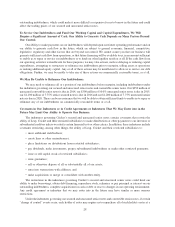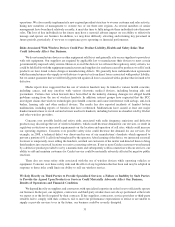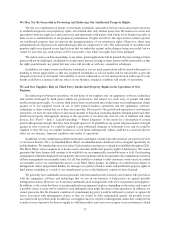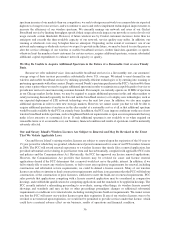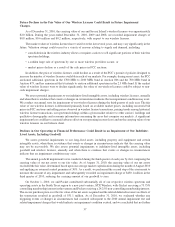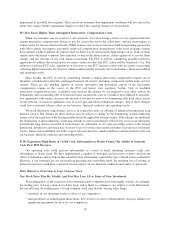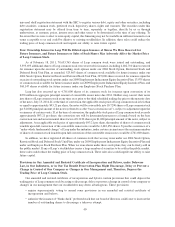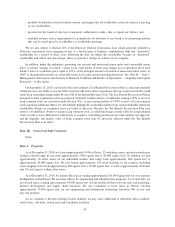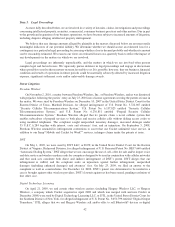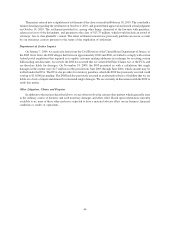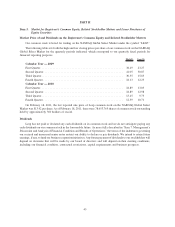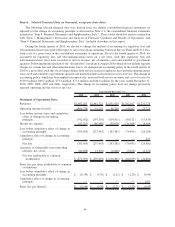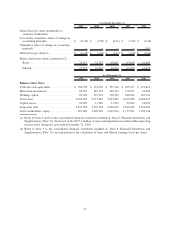Cricket Wireless 2010 Annual Report Download - page 44
Download and view the complete annual report
Please find page 44 of the 2010 Cricket Wireless annual report below. You can navigate through the pages in the report by either clicking on the pages listed below, or by using the keyword search tool below to find specific information within the annual report.impairment of goodwill was required. There can be no assurance that impairment conditions will not exist in the
future that require further impairment charges to reduce the carrying amount of our goodwill.
We May Incur Higher Than Anticipated Intercarrier Compensation Costs.
When our customers use our service to call customers of local exchange carriers, we are required under the
current intercarrier compensation scheme to pay the carrier that serves the called party, and any intermediary or
transit carrier, for the use of their networks. While in most cases we have been successful in negotiating agreements
with other carriers that impose reasonable reciprocal compensation arrangements, some local exchange carriers
have claimed a right to unilaterally impose what we believe to be unreasonably high charges on us. Some of these
carriers have threatened to pursue, have initiated, or may in the future initiate, claims against us to recover these
charges, and the outcome of any such claims is uncertain. The FCC is actively considering possible regulatory
approaches to address this situation but we cannot assure you that any FCC action will be beneficial to us. The
adoption of adverse FCC rules, regulations or decisions or any FCC inaction could result in carriers successfully
collecting higher intercarrier fees from us, which could materially adversely affect our business, financial condition
and operating results.
More broadly, the FCC is actively considering whether a unified intercarrier compensation regime can or
should be established for all traffic exchanged between all carriers, including commercial mobile radio services
carriers. There are also pending appeals of various substantive and procedural aspects of the intercarrier
compensation regime in the courts, at the FCC and before state regulatory bodies. New or modified
intercarrier compensation rules, if adopted, may increase the charges we are required to pay other carriers for
terminating calls or transiting calls over their networks, increase the costs of, or make it more difficult to negotiate,
new agreements with carriers, decrease the amount of revenue we receive for terminating calls from other carriers
on our network, or result in significant costs to us for past and future termination charges. Any of these changes
could have a material adverse effect on our business, financial condition and operating results.
We resell third party long distance services in connection with our offering of unlimited international long
distance service. The charges for these services may be subject to change by the terminating or interconnecting
carrier, or by the regulatory body having jurisdiction in the applicable foreign country. If the charges are modified,
the terminating or interconnecting carrier may attempt to assess such charges retroactively on us or our third party
international long distance provider. If such charges are substantial, or we cease providing service to the foreign
destination, prospective customers may elect not to use our service and current customers may choose to terminate
service. Such events could limit our ability to grow our customer base, which could have a material adverse effect on
our business, financial condition and operating results.
If We Experience High Rates of Credit Card, Subscription or Dealer Fraud, Our Ability to Generate
Cash Flow Will Decrease.
Our operating costs could increase substantially as a result of fraud, including customer credit card,
subscription or dealer fraud. We have implemented a number of strategies and processes to detect and prevent
efforts to defraud us, and we believe that our efforts have substantially reduced the types of fraud we have identified.
However, if our strategies are not successful in detecting and controlling fraud, the resulting loss of revenue or
increased expenses could have a material adverse impact on our financial condition and results of operations.
Risks Related to Ownership of Leap Common Stock
Our Stock Price May Be Volatile, and You May Lose All or Some of Your Investment.
The trading prices of the securities of telecommunications companies have been highly volatile. Accordingly,
the trading price of Leap common stock has been, and is likely to continue to be, subject to wide fluctuations.
Factors affecting the trading price of Leap common stock may include, among other things:
• variations in our operating results or those of our competitors;
• announcements of technological innovations, new services or service enhancements, strategic alliances or
significant agreements by us or by our competitors;
38


